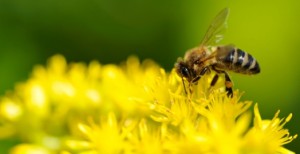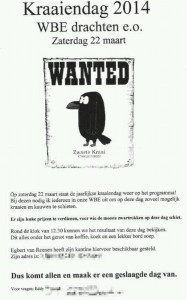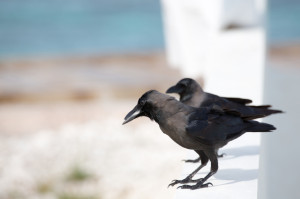Worldlog Settimana 13 – 2014
Abbiamo passato delle settimane interessanti e belle, con la campagna elettorale dei comuni. Mercoledì il 19 di marzo era ora: i Paesi Bassi andavano a votare. Abbiamo avuto il 100% di guadagno: da una rappresentanza del Partito per gli Animali in sei comuni siamo ora rappresentati in 12 comuni! Abbiamo raggiunto un seggio nei comuni di Amsterdam, Leiden, L’Haya, Pijnacker-Nootdorp, Gouda, Rotterdam, Utrecht, Buren, Arnhem, Apeldoorn, Groningen e Vlagtwedde. A Vlagtwedde abbiamo la stessa grandezza del partito VVD (partito del popolo per la libertà e la democrazia) e ad Amsterdam abbiamo avuto più voti del CDA (Appello Cristiano Democratico) J.
Il risultato di queste elezioni dimostra un’enorme crescita nel numero di elettori che vuole tenere ai loro ideali. Nei sei comuni dove eravamo già presenti nel comune, abbiamo avuto molto più voti della volta scorsa. Significa che sappiamo raggiungere un numero sempre più alto di gente che non sceglie per le interesse a breve termine dell’uomo, ma dia priorità alla compassione e la sostenibilità. Nelle prognosi nazionali abbiamo anche il 50% più voti rispetto alle elezioni nel 2012.
Tutti i membri attivi dei 12 comuni, tutti i leader di partito e l’associazione del Partito per gli Animali ad Amsterdam: congratulazioni e grazie molte per il vostro impegno!
E ovviamente voglio ringraziare tutti gli elettori nei 12 comuni che hanno votato per l’unico partito che non guardi le interesse a breve termine della specie umana!
Una bella notizia anche dalla Camera. Vi sarà un divieto per i pesticidi dannosi che contengano i neonicotinoidi. Questo veleno è pericoloso per le api ed altri insetti come i bombi e contribuisce alla morte delle api. Na maggioranza della Camera era d’accordo con noi ed ha voluto vietare l’utilizzo di questo veleno per le api nell’agricoltura e la vendita ai consumatori.
I neonicotinoidi sono dei veleni relativamente nuovi che hanno degli effetti disastrosi sulle api. Questa sostanza è migliaia volte più velenosa del DDT. Per questo motivo combattiamo già da anni contro i neonicoinoido. All’inizio del 2013 abbiamo trovato una maggioranza della Camera per la mozione di Esther Ouwehand per un divieto europeo per questo veleno che viene utilizzato nell’agricoltura. Grazie anche alla mozione, ora nell’UE viene vietato l’utilizzo di tre tipi di neonicotinoidi. Le misure europee però lasciano in pace la maggior parte dell’utilizzo dei nicotinoido: l’80% nei Paesi Bassi può ancora essere utilizzato. Mentre il nostro paese è nella top-tre dei paesi con l’utilizzo maggiore di veleno nell’agricoltura e la mortalità delle api è particolarmente alta!
I corvi sono sull’elenco nazionale di “eccezioni”, il che vuol dire che durante tutto l’anno chi ha della terra può ammazzarli su quella terra, nel caso di danni chiari e dimostrati. Quest’ultimo raramente viene dimostrato indipendentemente. E’ ridicolo che in primavera, durante la cova delle uova, i cacciatori possano sparare gli uccelli e lo facciano pure diventare una gara. Queste pratiche dimostrano nuovamente che la gestione della natura non deve essere data in mano ai cacciatori con un fucile.
Fortunatamente la “giornata dei corvi” è stata cancellata dopo le mie domande nella Camera. Molto bene!
Siamo alla vigilia della campagna per le elezioni parlamentari europee. Ho capito che partecipano anche i partiti per gli animali di Spagna, Portogallo, Germania ed Inghilterra. La popolarità del Partito per gli Animali in Europa è sempre di più!
Saluto,
Marianne
With the campaign for the municipal elections, we have exciting and beautiful weeks behind us. Wednesday 19 March was the day: the Netherlands went to the polls. We gained 100%: from a representation of the Party for the Animals (PvdD) in 6 municipalities, we are now represented in 12 municipalities! We obtained seats in Amsterdam, Leiden, The Hague, Pijnacker-Nootdorp, Gouda, Rotterdam, Utrecht, Buren, Arnhem, Apeldoorn, Groningen and Vlagtwedde. In Vlagtwedde, we are as big as the People’s Party for Freedom and Democracy (VVD) and in Amsterdam we won more votes than the Christian Democratic Appeal (CDA) 🙂
The outcome of the elections has shown an enormous increase in the number of voters that want to hold on to their ideals. Compared to last time, we won a lot more votes in the 6 municipalities where we were in the council already. This means we managed to reach an increasing number of people who do not choose short-term interests of people, but focus on compassion and sustainability. Moreover, in the national forecast, we also won 50 per cent compared to the elections in 2012.
To all active members in the 12 municipalities, to all candidates and to the Party Bureau of the Party for the Animals in Amsterdam: Congratulations and many thanks for all your efforts!
And, of course, I would like to thank all voters in the 12 municipalities for their votes on the only party that is not based on the short-term interests of its own species!
More good news from the Lower House. There will be a ban on the use of highly hazardous pesticides containing neonicotinoids. This poison is dangerous to bees and other pollinators, such as bumble bees, and plays a part in the massive bee deaths. A Parliamentary majority sided with us for a national moratorium on the use of this bee poison in agriculture and for sale to private individuals.
Neonicotinoids are relatively new pesticides that have a disastrous effect on bees. To illustrate, this substance is thousands of times more toxic than DDT. We have therefore fought against neonicotinoids for years. At the start of 2013, a motion of Esther Ouwehand for a European ban on this pesticide obtained a Parliamentary majority. Partly owing to this motion, the use of three types of neonicotinoid has now been curbed in the EU. However, the European measures leave most neonicotinoid uses unchanged: as much as 80% remains unaffected in the Netherlands. Whereas our country is in the top-3 of countries with the highest pesticide levels in agriculture and bee deaths are exceptionally high here!
This week, I asked Parliamentary questions about “crow day” in Drachten, organised by hunting clubs (WBEs). In a pamphlet, hunters are challenged to shoot as many living crows and jackdaws from the sky as possible to win “nice prices”.
Crows and jackdaws are included on the “national exemption list”, which means that land users may “fight” both animal species on their lands during the entire year in case of proven major damage. This last aspect is hardly ever proven independently. It is a travesty that hunters are permitted to unscrupulously blast birds from the sky in the breeding season and even make a contest of it too. These sorts of practices once again show that the conservation of nature ought not to be placed in the hands of hobbyists with guns.
Fortunately, crow day in Drachten has been called off in response to my Parliamentary questions. Good!
We are on the eve of the campaign for the European Parliamentary elections. I understand that the parties for the animals in Spain, Portugal, Germany and England will also take part in the elections. The rise of the Party for the Animals in Europe is unstoppable!
Greetings,
Marianne


